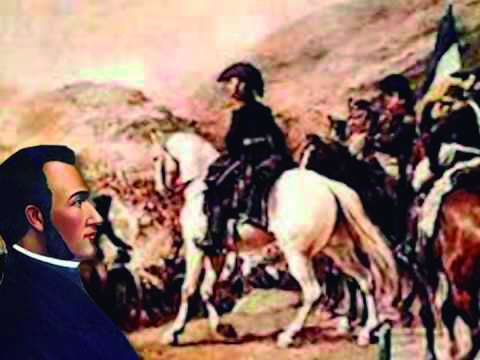Tanto en su condición de Presidente de la República Federal como de ciudadano en el auto-impuesto exilio, el prócer siempre estuvo presto a resguardar la integridad y soberanía patria.
En 1832 ocurrió una triple invasión a suelo ístmico, coordinadas simultáneamente por los enemigos de la nación, centroamericanos y extranjeros. Manuel José Arce penetró por Soconusco; Vicente Domínguez capturó Trujillo y Ramón Guzmán junto a Antonio Fernández, ambos de nacionalidades hispanas, se apoderaron de la fortaleza de Omoa, izando la bandera española, pretendiendo hacer retroceder a Centroamérica al pasado colonial, del cual recién se había liberado.
Desde Guatemala, Morazán despachó tropas para vencer a los contrarrevolucionarios, en cumplimiento del juramento prestado al asumir la presidencia: velar por el honor nacional, portando tanto la ley como las armas. Tras diez meses de contraofensiva, se derrotó a los alzados, capturándose a Domínguez y Guzmán, siendo fusilados. Entre las bajas federales, en número mayor a cincuenta, perecieron en cumplimiento del deber los coroneles José Antonio Márquez, José María Gutiérrez, José del Rosario López Plata y el oficial Calixto Carías. La República se había salvado gracias al heroísmo y patriotismo del ejército. En 1839, estando Morazán en el destierro que duraba ya veintidós meses, presto a trasladarse de Perú a Chile, le llegó notificación en la que el Jefe de Estado de Nicaragua apelaba a los centroamericanos para repeler la agresión inglesa que habíase apoderado de las Islas de la Bahía y, por mediante de sus aliados misquitos, del puerto de San Juan del Norte, punto de partida del proyectado canal interoceánico. El imperialismo británico mostraba su ambición por el control de la estratégica ruta canalera que acortaría las distancias entre los mares, de la cual era prácticamente dueña merced a su indisputado poder naval y financiero.
El 22 de febrero de 1842, ya en el puerto de La Unión, envía comunicación al Presidente salvadoreño, ofreciendo un buque armado y su tripulación de voluntarios. “Señálesenos el lugar que debemos ocupar y el jefe a quien obedecer, y la manera con que cumplamos las órdenes de los gobiernos de los Estados será la mejor garantía de las sanas intenciones que nos han conducido a la República”. Propone intentar llegar a un arreglo negociado con Londres, por cuanto “las armas son medios usados por los que carecen de razón y la que tienen los centroamericanos en la cuestión presente, no puede admitir duda ni por aquellos que se han posesionado de una parte de nuestro territorio… Pero si… no se pudiese lograr una transacción honrosa para la República, quedará por lo menos a los centroamericanos, la satisfacción de haberla procurado y de acreditar al mundo entero que si se les coloca entre la humillación y la guerra, elegirán siempre el último partido, aún cuando tengan la certeza de no poder salvar más que el honor”.
Morazán, defender of Central American independence
Both as President of the Federal Republic and as a citizen in self-imposed exile, the hero was always ready to protect the integrity and sovereignty of the country.
In 1832 there was a triple invasion of isthmic soil, coordinated simultaneously by the enemies of the nation, Central Americans and foreigners. Manuel José Arce penetrated by Soconusco; Vicente Domínguez captured Trujillo and Ramón Guzmán along with Antonio Fernández, both of Hispanic nationalities, seized Omoa’s fortress, raising the Spanish flag, pretending to push Central America back to the colonial past, from which it had just been released.
From Guatemala, Morazán dispatched troops to defeat the counterrevolutionaries, in compliance with the oath taken upon assuming the presidency: ensure national honor, bearing both the law and weapons. After ten months of counteroffensive, the elevators were defeated, capturing Dominguez and Guzman, being shot. Among the federal casualties, in numbers greater than fifty, the colonels José Antonio Márquez, José María Gutiérrez, José del Rosario López Plata and the officer Calixto Carías died in compliance with their duties. The Republic had been saved thanks to the heroism and patriotism of the army. In 1839, while Morazán was in exile that lasted twenty-two months, ready to move from Peru to Chile, he received notification in which the Head of State of Nicaragua appealed to Central Americans to repel the English aggression that had taken over the Islands of the Bay and, through its misquito allies, the port of San Juan del Norte, the starting point of the projected interoceanic canal. British imperialism showed its ambition for the control of the strategic canal route that would shorten the distances between the seas, of which it was practically owner thanks to its undisputed naval and financial power.
On February 22, 1842, already in the port of La Unión, he sent communication to the Salvadoran President, offering an armed vessel and his volunteer crew. «Point out to us the place we must occupy and the chief to obey, and the manner in which we comply with the orders of the governments of the States will be the best guarantee of the healthy intentions that have led us to the Republic.» He proposes to try to reach a negotiated settlement with London, because “weapons are means used by those who lack reason and that Central Americans have in the present issue, can not admit doubt or by those who have taken possession of a part of our territory … But if … an honorable transaction for the Republic could not be achieved, at least the Central Americans will be left with the satisfaction of having sought and accrediting the entire world that if they are placed between humiliation and war, they will always choose the last game, even if they have the certainty of not being able to save more than honor.

